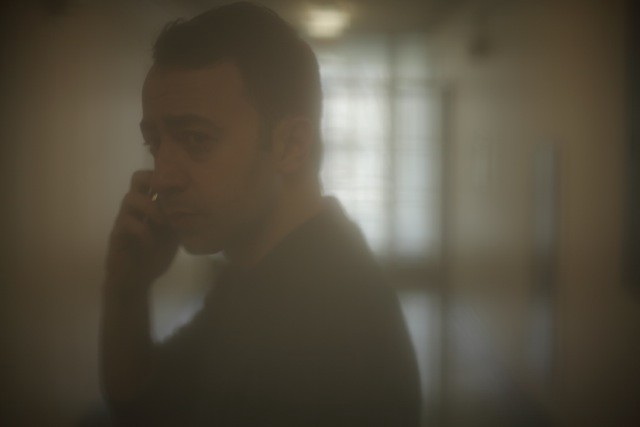Yassmina Karajah was born in Amman, Jordan, and is a graduate of the Bristol Law School. She studies film production at the University of British Columbia.
In Light (2014), her directorial debut, a Lebanese man devastated by the death of his newborn son is challenged by his mother’s request that he perform Islamic pre-burial rituals in the confines of a hospital. Avoiding melodrama, Karajah delivers a deeply affecting story about culture, loss, and devotion. (TIFF official site)
The 13-minute short Light will play at the Toronto International Film Festival on September 8.
WaH: Please give us your description of the film playing.
YK: Light is a drama that documents a few hours in the life of a recently landed immigrant who, after the death of his stillborn son, is faced with the challenge of performing a religious, pre-burial ritual on the body to fulfill his mother’s wishes.
WaH: What drew you to this story?
YK: I wrote this script because I wanted to explore the concepts of home and death. When it comes to home, it was about the duality of belonging and being constantly neither here nor there.
Due to my studies and travels, I got to a point where I felt that every place I moved to was a place I could potentially call home. There was something liberating yet contradictory about that, as I felt I was always yearning for the familiar, especially in stories I wanted to tell. This short film is an attempt at understanding that.
As for death, when I was younger, a relative in Jordan lost a baby boy, and being a child myself back then, I was there to witness how family members dealt with it. It made me want to reflect on how people grieve and how procedures such as wills, funerals and rituals play an ironic role in our mourning.
The main question for me was, What would the death of a loved one feel like in a moment of loneliness, away from “home”? With Light, I was able to create one situation to explore these two concepts.
WaH: What was the biggest challenge in making the film?
YK: The biggest challenge was attempting to ensure that the focal aspect was bringing to life a character-based plot, rather than a social or religious commentary. The situation itself, somewhat culturally specific, is intrinsically one of personal struggle in times of isolation and inner conflict. The opportunity lay in creating a moment that anyone could identify with, not limited to religious, social or cultural affiliation.
WaH: What do you want people to think about when they are leaving the theatre?
YK: I hope that this film would trigger some sense of self-reflection. I hope people leave the film reflecting on moments of solitude or alienation they’ve experienced. Moments when we are faced with having to make decisions, when our instincts are brought to question, and when the stark reality of aloneness really hits us. To reflect on their own associations to home and to immediate family, its baggage, and its inevitable influence in times of struggle.
WaH: What advice do you have for other female directors?
YK: Embarking on a new project in its early stages comes with a lot of support, but also a lot of skepticism. I would say that it is important to trust your vision and to always know why you essentially started with an idea.
I also would say to give yourself room for discovery. I started this project because I had questions I wanted to answer for myself. It was about focusing on what I had a deep understanding of and what felt right and real, but also on what I found challenging and wanted to explore. This maintained a balance between the familiar and the unfamiliar throughout the process.
WaH: How did you get your film funded?
YK: This film was made through the University of British Columbia Film Production Program. It was funded independently.
WaH: Name your favorite women directed film and why.
YK: My favorite woman-directed film is Caramel by Nadine Labaki. It is a film that reflects the bittersweetness of womanhood with great honesty. Its ability to mesh the humor and seriousness of very relatable situations is something that really struck a chord with me.







